|
Otello - La Maestranza Sevilla
|
| |
Teatro de la Maestranza, Sevilla, Premiere October
25, 2002
Impressions and contents Part
1 - Partl
2 - Part
3
Otello

A strange sight for a premiere !
Orchestra strike in Seville
Photos: Teatro de la Maestranza, Birgit Popp Text: Birgit Popp
Certainly Carlos Álvarez would have appreciated to have his stage debut
as Jago in Verdi's Otello with less dramatic circumstances, as this was
the case in Seville (ESP) at October 25, 2002. Nevertheless, it became
an outstanding performance of the Spanish baritone. But, step by step:
For all four Otello performances the Symphonic Orchestra of Seville had
announced a strike. The orchestra does not belong to the the Seville
opera house Teatro de la Maestranza, but uses it for about forty
symphonic concerts per season and plays all operas given in this house.
Therefore, the strike would have meant that all Otello performances
would have to be cancelled. To avoid this, the management of the Teatro
de la Maestranza decided to move all four performances for one day. It
believed that with this action a strike could be averted because due to
Spanish law a strike would have to be announced at least two weeks in
advance, otherwise it would be illegal. This circumstance did not bother
about fifty percent of the orchestra members. They moved all dates of
the strike also for one day. At the evening of the premiere a bit more
than half of the orchester members appeared and wanted to play, but with
half of the players no opera could have been given and also they were
sent back home.
|
|
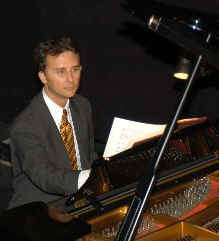
The savior of the premiere:
Leonardo Catalanotte
|
But, the Spanish conductor Jesús López Cobos agreed to a
performance just with piano and saved the premiere with this decision
together with the pianist Leonardo Catalanotte, who had originally been
engaged as correpetitor and director of the stage musicians. The trumpets
on the stage were placed choreographically a bit differently and were
conducted by the choir director Valentino Metti together with the choir.
Leonardo Catalanotte was sitting like during the piano rehearsals as the
only companion of the singers with his piano next to the conductor in the
orchestra pitch. |
| Just about ten per cent of the audience made use of the theater's offer
to leave the performance and to receive back their ticket fees. One thing
is for certain, new friends the Seville orchestra has not found with its
action. When at the end of the second performance the conductor asked the
orchestra members to raise from their chairs for the final applause, a
storm of booing broke out. |
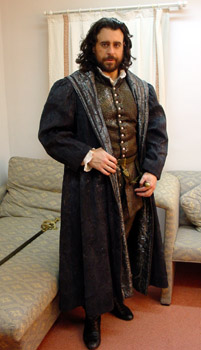
Carlos Álvarez as Jago
|
The star of the performances was without doubt Carlos Álvarez, whose
stage debut as Jago had been followed with great attention in Spain. And,
if with or without orchestra, it was a splendid premiere for the singer
from Málaga, with whose stage presence and vocal qualities only few
singers can compete. That his popularity in Spain and in other places like
Vienna comes already - after just a third of the tenor's years on stage -
close to Plácido Domingo's, does not come without reason, including the
human aspect.That Carlos Álvarez, who can be mainly seen in positive characters like
the Marquis de Posa in Don Carlos or Carlos in Ernani, reminds as Jago
about Henry Fonda in 'Play me the song of death' does not surprise either.
Evil and spiteful, but still a sympathetic figure ..... |
| The reason is not
only to search in his own person, but also in his view of the role of
Jago, "Jago must be a calm and quiet person, in whom someone does not
recognize the evil on the first glance. Not his exterior is evil, but his
acting and his interior." Vocally the role suits Carlos Álvarez very
well like all Verdi parts. So, for example, he can bring to bear very well
his excellent sense for rhythm in the drinking song of the first act or
his skillful interplay between piani on one side and forte outbreaks on
the other side in the Credo of the second act. |
|
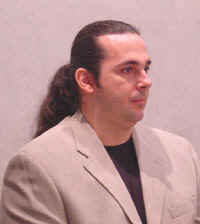
Rank Porretta
|
Jago is the real protagonist of the opera, although Verdi and his
librettist Arrigo Boito have hold on to Shakespeare's title Otello. Otello
himself is brought on stage by the US-American tenor Frank Porretta. The
Julliard School graduate can look upon a musical career, which is quite
unusual for an opera singer. He has started as a musical and rock singer,
before he began to let his voice blossom without microphone on the opera
stage at the end of the nineties. |
| The part of the Moor of Venice, whom he had embodied already in smaller
opera houses in the U.S.A., was the European debut of Frank Porretta, who
counts to his actual roles also Cavaradossi (Tosca), Kalaf (Turandot),
Radamés (Aida) and Manrico (Il travatore) and who will debut soon in
Andrea Chernier and La bohčme. With his stoic calm, which appears quite
unusual for tenors, he considers it for natural to sing a part like Otello,
which is for most tenors the crowning of a long career, already at the
beginning of his operatic career, "Vocally the part is not very
difficult for me. I can also very well put myself into the character of
Otello, though it is not close to my own one, and I love Verdi." But,
the giant New York citizen comes up also with other surprises: his piani
are very sensible and sung with a beautiful voice and also in his acting
is very sensitive. |
|
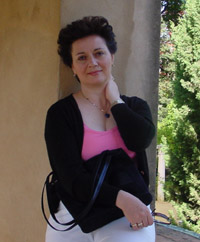
Hasmik Papian
|
At his side as his wife Desdemona acts the in Vienna living, Armenian
born Hasmik Papian. The at all major opera houses of the world celebrated
soprano performed the ballad of the willow and her prayer in the fourth act
shortly before her violent death through Otello's hands very charmingly and
with touching voice. At the same time she is a strong wife, who presents to
Otello the in her eyes just case, the reinstatement of Cassio in the rank of
a captain, vehemently and persistently. A woman, who knows, what she wants,
and who is not only the submissive wife. This fact leads finally to her
fatal ruin, without that she would know why. |
|
The through Jago as the lover of Otello's wife reported and by wrong
proofs seemingly convicted Cassio brings with Ángel Rodríguez a young
Spanish tenor on stage, whose voice is coined by a beautiful sound, clear
heights, good flow of the lines and carrying capacity. It would be very
welcome to hear him more often as so far also in bigger parts.

Carlos Álvarez and Ángel
Rodríguez
As the
Venetian envoy Lodovico Stefano Palatchi comes up with a powerful,
well-tempered bass. Also all smaller parts were well cast with the tenor Vincenc Esteve Madrid as
Roderigo, the baritone Juan Tomás Martínez, who was at the same time for
the case of the cases the Jago cover, as Montano, the bass baritone
Fernando Latorre as herald and the mezzo-soprano Marina Pardo as Emilia.
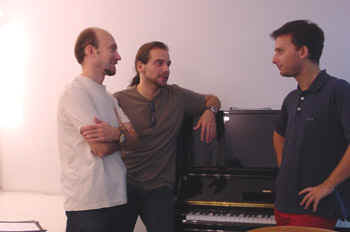
Fernando Latorre, Vicenc Esteve
Madrid, Leonardo Catalanotte (from left)
|
|
The choir
had his by Valentino Metti well rehearsed appearances especially with the
sonorous choir of the first act and the with homage paying tenderness
offered song in honor of Desdemona in the second act. The musical director
Jesús López Cobos, who will become in the next season the musical
director of the Teatro Real at Madrid, worked out very precisely and with
great sensitivity the dynamics and especially the pianissimi of the score
and offered with the - when present - orchester a sounding arc of tension.
But a special 'bravo' has to be given also in this place to the Italian
pianist Leonardo Catalanotte, the savor of the first night.
Birgit
Popp
|
|
Otello
Oper
in vier Akten/Opera in four acts
Musik/Music:
Giuseppe Verdi (1813 - 1901)
Libretto:
Arrigo Boito
(1842 - 1918)
basierend/based auf/on William Shakespeare's Othello
|
Dirigent/Conductor
|
|
Jesús
López Cobos |
|
Regisseur/Stage
director
|
|
Nicolas
Joel |
|
Ausstatter/Designer
|
|
Ezio
Frigerio |
|
Licht/Lightning
|
|
Vinicio
Cheli |
|
Chordirektor/Choir
director
|
|
Valentino
Metti |
|
Pianist
|
|
Leonardo
Catalanotte |
|
|
|
|
|
Otello
|
|
Frank
Porretta
|
|
Jago
|
|
Carlos
Álvarez
|
|
Cassio
|
|
Ángel
Rodríguez
|
|
Roderigo
|
|
Viççenç
Esteve Madrid
|
|
Lodovico
|
|
Stefano
Palatchi |
|
Montano
|
|
Juan
Tomás Martínez |
|
Herold/Herald
|
|
Fernando
Latorre |
|
Desdemona
|
|
Hasmik
Papian |
|
Emilia
|
|
Marina
Pardo |
|
|
Chor
des Teatros de la Maestranza
Sinfonie-Orchester
Sevilla |
Impressions and contents
Part
1 - Partl
2 - Part
3
Bericht
Top
|
|